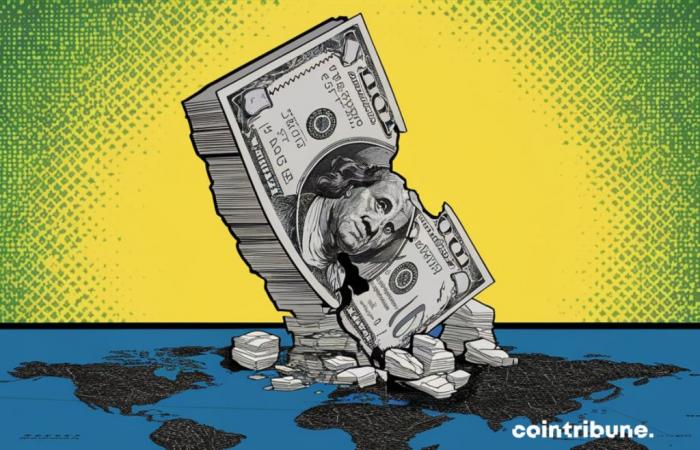Sat June 15, 2024 ▪
6
min reading ▪ by
Nicholas T.
The IMF has published its quarterly update of foreign exchange reserves held by central banks. The dollar is in free fall. Bitcoin as an alternative?
The dollar falls into disuse
The IMF notes in its paper that “the US dollar continues to lose ground in global foreign exchange reserves”but there remains “the main reserve currency”.
The institution inherited from the Bretton Woods agreements warns that economic and financial fragmentation could encourage certain countries to diversify their foreign exchange reserves.
Latest data on the composition of official IMF foreign exchange reserves indicates a decline “progressive” from the dollar.
The word progressive is an understatement. The dollar’s share fell from 70% to 58% in just two decades. Knowing that the real figure is more like 55% if we correct it for the appreciation of the dollar linked to the high rates of the American central bank:
We even drop to 48% if we take into account gold reserves!
The IMF notes on this subject:
“We see that financial sanctions encourage central banks to slightly modify their reserve portfolios away from currencies, which are at risk of being frozen, in favor of gold. »
For example, India recently repatriated 100 tonnes of gold from London. Gold also seems to be an integral part of the new international monetary system that the BRICS wish to put in place.
According to the Iranian Foreign Minister, “BRICS economy ministers are on the verge of completing the dedollarization program”. What will be the pivotal currency that will replace it? Radio silence for now.
Pretenders for the throne?
The IMF notes that it “It is striking that the reduction in the role of the US dollar over the last two decades has not been accompanied by an increase in the share of the other four major currencies, namely the euro, the yen and the pound”.
Rather, it is non-traditional reserve currencies such as the Australian dollar, the Canadian dollar, the Chinese yuan, the South Korean won, the Singapore dollar and the Nordic currencies that are doing well.
The Chinese yuan is another non-traditional reserve currency, but its internationalization “shows signs of shortness of breath”, we can read in the paper. The share of the yuan in foreign exchange reserves has even fallen since 2022.
That being said, the growth of the Chinese currency as an international means of payment is strong. The Cross-Border Interbank Payment System (CIPS) has facilitated trade amounting to 123 trillion yuan in 2023 ($17 trillion).
Finally, and contrary to what we can read here and there, the dollar does not suffer from the distrust of a handful of large reserve holders. Russia obviously has good reasons to get rid of the dollar, but this is an underlying trend:
“We have identified in 2022 at least 46 countries that are diversifying their reserves (countries whose share of foreign exchange reserves in non-traditional currencies is at least 5% at the end of 2020). These include major advanced economies and emerging markets, including most G20 economies. »
The Sino-Russian axis and Bitcoin
The Russian central bank said this week that the Chinese yuan will become Russia’s main foreign currency. The yuan/ruble exchange rate will now determine the trajectory of all other currency pairs, including the euro and dollar.
“The yuan has already become the main currency in foreign exchange transactions”, said the Bank of Russia. “The yuan/ruble exchange rate will now be the reference rate for market participants. »
“The share of the yuan in transactions on the Moscow Stock Exchange in May was 54%”, she added. A figure expected to increase since the euro and the dollar have just been completely banned following a new round of Western sanctions.
All this should be put in parallel with the arrival of Saudi Arabia, the United Arab Emirates and Iran within the BRICS. The end of the petrodollar is fast approaching, and this is precisely why the Empire is trying to maintain chaos in Ukraine, Palestine and probably soon in Georgia, the Philippines, Taiwan, etc.
The fact that all central banks keep dollars (Treasury bills in reality) is an exorbitant privilege that Washington does not want to give up. Here are its main advantages:
-Trade balance chronically in deficit without suffering from a fall in the dollar.
-Low borrowing rate.
-Possibility of blackmailing nations through the threat of sanctions (disconnection from the SWIFT network).
“Rather war than let China take away our monetary hegemony”, we probably say to ourselves in the United States. The solution would be for all nations to be on an equal footing by using a neutral currency: Bitcoin.
As such, the largest bank in the world (Industrial and Commercial Bank of China) has just declared that bitcoin “displays a scarcity similar to gold, via mathematical consensus, while resolving issues of divisibility, authenticity and portability.”
We are moving towards the new Bretton Woods: Bitcoin.
Maximize your Cointribune experience with our ‘Read to Earn’ program! For every article you read, earn points and access exclusive rewards. Sign up now and start earning benefits.
Click here to join ‘Read to Earn’ and turn your passion for crypto into rewards!
Nicholas T.
Reporting on Bitcoin, “the goddess of wisdom, feeding on the fire of truth, exponentially growing ever smarter, faster, and stronger behind a wall of encrypted energy”.





